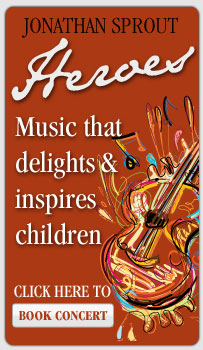Seven Most Important Lessons my Heroes Taught Me - Lesson #1
- Font size: Larger Smaller
- Hits: 52452
- Subscribe to this entry
- Bookmark
Seven Most Important Lessons my Heroes Taught Me
By Jonathan Sprout
Since 1994, I’ve immersed myself in the lives of 40 of America’s greatest heroes. I’ve travelled the United States interviewing historians and visiting hero sites. I’ve read hundreds of books by and about my heroes and listened to countless teachers, parents, students, and administrators tell me about their favorite heroes.
A few months ago, I was honored with an opportunity to speak about my work. The act of writing my speech over a three month period enabled me to recognize seven important lessons my heroes have taught me.
I’ll share them with you over the course of the next several weeks, one lesson at a time. Please respond with your insights!
Lesson #1: Go high.
In July of 2016, First Lady Michelle Obama gave a speech in Philadelphia. “Barack and I,” she said, “…as we try to guide and protect our girls, insist that the hateful language they hear from public figures on TV does not represent the true spirit of this country. We explain that when someone is cruel or acts like a bully, you don’t stoop to their level … Our motto is: when they go low, we go high.”
My heroes “went high” whenever possible. They knew it’s not just about what you do. It’s also about how you do things that defines you and determines your effectiveness as a leader. Real heroes walk the talk. Character counts.
Martin Luther King, Jr. travelled to India to research Mohandas Gandhi’s hard-headed tactics of outwitting rather than destroying oppressors. He learned about the practicality of nonviolent resistance. Dr. King preached “an eye for an eye and a tooth for a tooth” leaves everyone blind and toothless. The best way to overcome racism and abuse is to act in powerful, life-affirming ways that do not create more victims. You do that by going high.
Dr. King so firmly believed in the practicality of going high, he made a promise – and kept it throughout his life – never to hurt anyone or anything, no matter what was said or done to him.
Tecumseh spent much of his life attempting to unite Native Americans against United States expansion. Five times as a child, he was forced to run from attacking settlers who burned his village, yet he grew into a generous, compassionate Shawnee leader.
He could have grown bitter and resentful, but instead, Tecumseh channeled his frustrations into a higher purpose. Admired by friends and enemies alike, he stood for simplicity, healthy living, honesty, reverence, and brotherhood. He traveled thousands of miles making passionate speeches before dozens of tribes, pleading for unity.
Although Tecumseh’s dream of an independent Indian nation died with him in battle in 1813, he was an uplifter. He is respected as one of the greatest Native Americans because he went high.
Jackie Robinson, before he broke the color barrier in Major League baseball, had a pivotal conversation with the wise man who signed him, Branch Rickey.
During an intense three hour meeting, Rickey asked, “When they come after you with racial hatred, will you be able to refuse to engage them?”
“Mr. Rickey,” Robinson questioned, “do you want a ballplayer who’s afraid to fight back?”
Rickey replied, “I want a ballplayer with guts enough not to fight back!”
Jackie Robinson had that kind of courage. In spite of racial hostility and death threats from players and fans, he “went high” playing the game of baseball with quiet dignity and extraordinary talent. He became an active spokesperson for civil rights, and in 1962 Jackie Robinson was the first African-American elected to baseball’s Hall of Fame.
He said, “There is not an American in this country who is free until every one of us is free.”
Go high.
Many of my heroes spent their entire adult lives working for democracy and equality, yet they never had the opportunity to vote.
Every one of us who is eligible to vote owes it them, to ourselves, and to future generations to objectively learn about the issues and the candidates, and VOTE. Always. Voting is a civic duty.
When you vote on November 6, I encourage you to pick the candidates who most often go high -- who are honest, compassionate, courageous, uplifting, and who thrive on inspiring others to be the best they can be.


